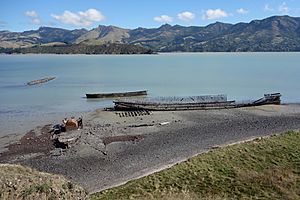Darra (clipper) facts for kids
The Darra was a fast sailing ship called a clipper. It had a special type of sails, known as "barque-rigged." It was built in Aberdeen, Scotland, and first sailed in 1865.
Contents
How the Darra Was Built
The Darra was built in Aberdeen, Scotland, by a company called Hall and Company. It had a special design called "composite construction." This meant its body, or hull, was made from strong wooden planks over a frame of wrought iron.
The ship was quite large. It weighed 999 tons. It was 190 feet long, 33 feet wide, and its bottom went 21 feet deep into the water.
Journeys of the Darra
Early Trips Across the World
The Darra was built for the Orient Line. Its very first journey was from Aberdeen to India in 1866. However, it seems the Darra only made one trip to India.
Soon after, in October 1866, the ship began carrying passengers to Australia. This was the start of many trips between London and Adelaide, Australia. The ship took people to Australia and brought goods back to London. In 1887, the Darra set a new record. It completed the journey from London to Adelaide in just 70 days.
The Darra Incident in San Diego
On November 26, 1887, the Darra was returning to London. It was carrying coal from Newcastle, Australia. The ship stopped in San Diego, California. The captain hired three sailors from the dock to help prepare the ship for sailing.
That night, about 20 men from a local sailors' union boarded the ship. They did not like that the captain had hired these new sailors. The union men forcibly took the hired sailors off the ship. The captain tried to stop them, even with a revolver, but the men carried the sailors back to shore. The local newspaper, the San Diego Union, reported on this event. Their headline on November 28 called it "It Smacks of Piracy."
The Darra in New Zealand
In 1899, the Darra was badly damaged by fire. This happened while it was in Sydney Harbour, Australia. The remains of the ship were bought by the Westport Coal Company. They planned to use it in New Zealand.
The Darra was towed to Dunedin, New Zealand, where it was repaired. Then, it was towed to Lyttelton. The ship no longer had its masts or sails. For the next 50 years, its empty hull was used as a coal hulk. This meant it stored coal for other steam ships in the Port of Lyttelton.
The Final Resting Place
In December 1950, the Darra was temporarily decorated. It was painted to look like another ship called the Charlotte Jane. This was part of the Christchurch centenary celebrations. After the celebrations, its decorations were removed. The hull was cut down and sold for scrap metal.
In 1951, the Darra was taken to a ship graveyard. This graveyard is on Quail Island. It was placed next to other old ships, including the Mullogh and two other former coal hulks. In April 1953, the army tried to destroy the remains of the Darra using explosives. However, the explosion only blew a hole in the side of the hull. The wreck of the Darra can still be seen on the island today.
 | Kyle Baker |
 | Joseph Yoakum |
 | Laura Wheeler Waring |
 | Henry Ossawa Tanner |



